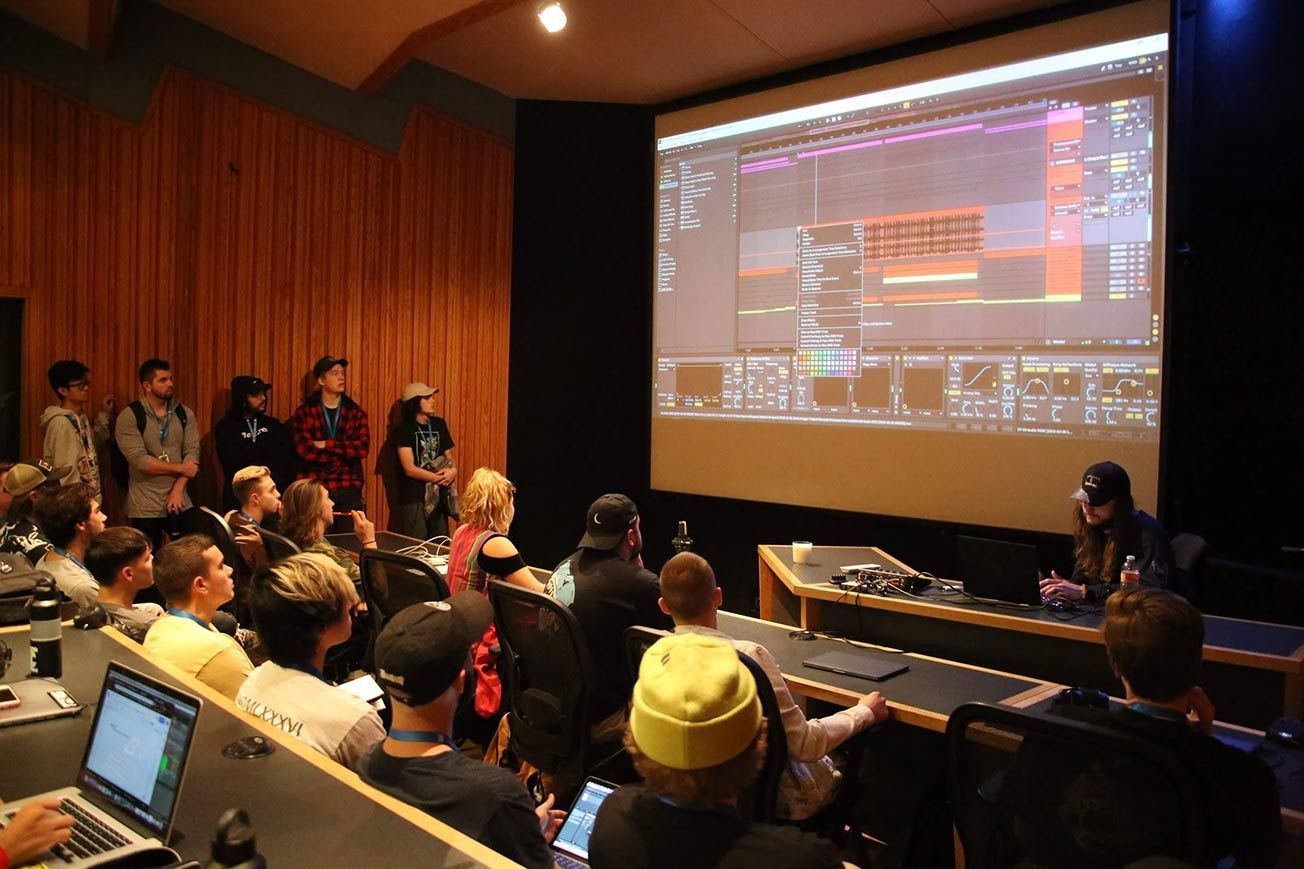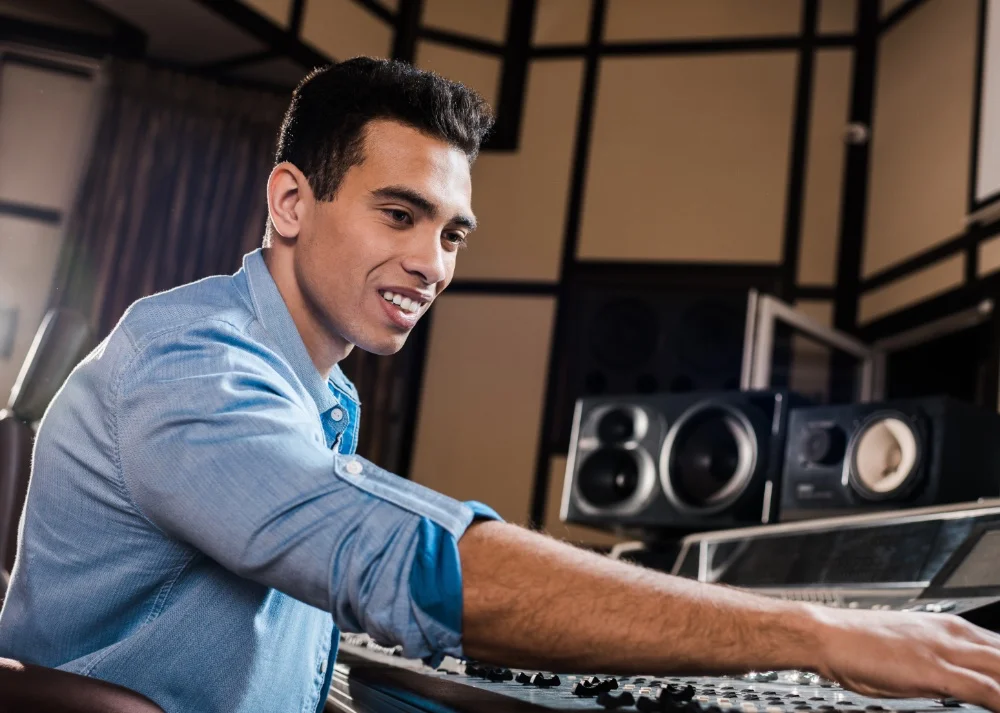What are the Best Music Production Schools in the World?
Choosing the best spot for tuning into music production is more art than science. It’s about what matches your goals as a music producer.
Names like Berklee College of Music, New York University, and SAE Institute are some of the best msuic production schools in the world. Their top-tier music production programs, futuristic facilities, and alumni hit-makers say it all.
What is Considered the #1 Music School in the World?
Finding the gold medalist in the global music school arena is tougher than picking a favorite song. Each has its charm. But, drumroll, please… Berklee College of Music often steals the show. With its broad set of courses, focus on today’s music scene, and a list of alumni that reads like a music festival lineup, it’s easy to see why.
A World Tour of Leading Music Production Schools
Let’s now cover the list of the best music production schools in the world and discuss what sets each apart and why they’re the go-to for those looking to make waves in the music production scene.
Berklee College of Music
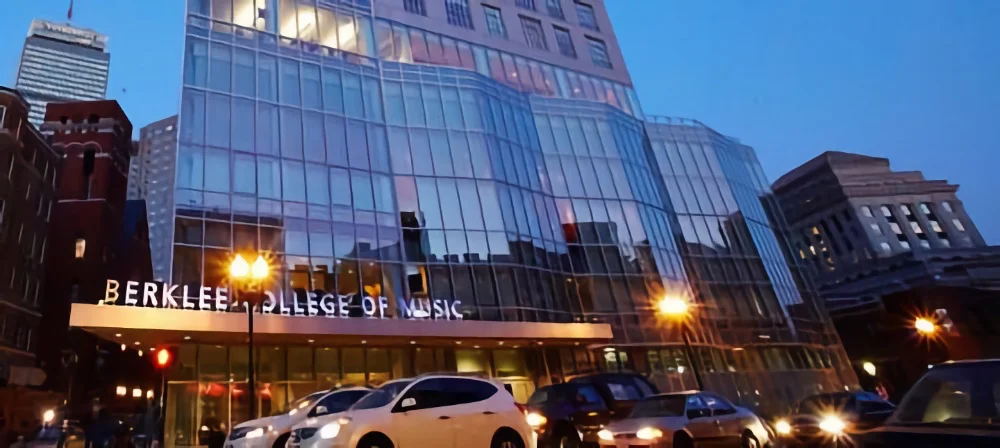
Programs Offered
Berklee College of Music offers a wide range of undergraduate programs, including a Bachelor of Music (B.M.) in Electronic Production and Design, which is highly relevant for students interested in electronic music and sound engineering.
This program focuses on the creation and production of contemporary electronic music and the design of new electronic instruments and software. Additionally, the Bachelor of Music in Contemporary Writing and Production may appeal to those interested in music production, as it teaches students to create and produce music recordings across various styles.
Faculty and Expertise
Berklee’s faculty includes industry professionals and accomplished musicians, ensuring students learn from experts with real-world experience(1). For example, the Electronic Production and Design department boasts instructors who are pioneers in electronic music, sound design, and music technology.
Curriculum Highlights
The core music curriculum at Berklee lays a solid foundation in music theory, ear training, and music technology, essential for all music production disciplines. The Electronic Production and Design program, in particular, offers courses in synthesis, audio programming, interactive music, and sound design for visual media, providing a comprehensive education in electronic music production.
Industry Connections
Berklee excels in networking and industry connections, offering students opportunities to connect with alumni and professionals through various events, workshops, and the Berklee Career Center. The college’s global network and industry partnerships facilitate internships, job placements, and collaborative projects, significantly benefiting students’ careers.
Tuition and Financial Aid
Berklee provides detailed information on tuition, financial aid, and scholarships to help students manage the cost of their education. Prospective students are encouraged to explore Berklee’s website or contact the financial aid office for the most current information.
Understanding the law and regulations surrounding financial aid options is crucial for both domestic and international students. This ensures compliance with eligibility criteria and maximizes the financial support available for their music education.
Career Support Services
The Berklee Career Center offers comprehensive support, including career advising, job and internship opportunities, and resources for entrepreneurship and career development. This ensures students are well-prepared to enter the music industry workforce upon graduation.
Berklee’s global presence, with campuses in Boston and Valencia, Spain, offers unique study abroad opportunities, enriching students’ educational experience with diverse cultural perspectives. The college’s commitment to innovation and contemporary music education makes it a leading choice for aspiring music professionals.
In summary, Berklee College of Music provides a robust education in electronic music, sound engineering, and music production, supported by experienced faculty, a comprehensive curriculum, and strong industry connections. Students have access to state-of-the-art facilities and a global network, preparing them for successful careers in the music industry.
These institutions represent the pinnacle of music production education, each offering unique strengths and opportunities. Whether through comprehensive curriculums, industry connections, or innovative teaching methods, these schools equip students with the skills needed to excel in the ever-evolving music industry.
SAE Institute
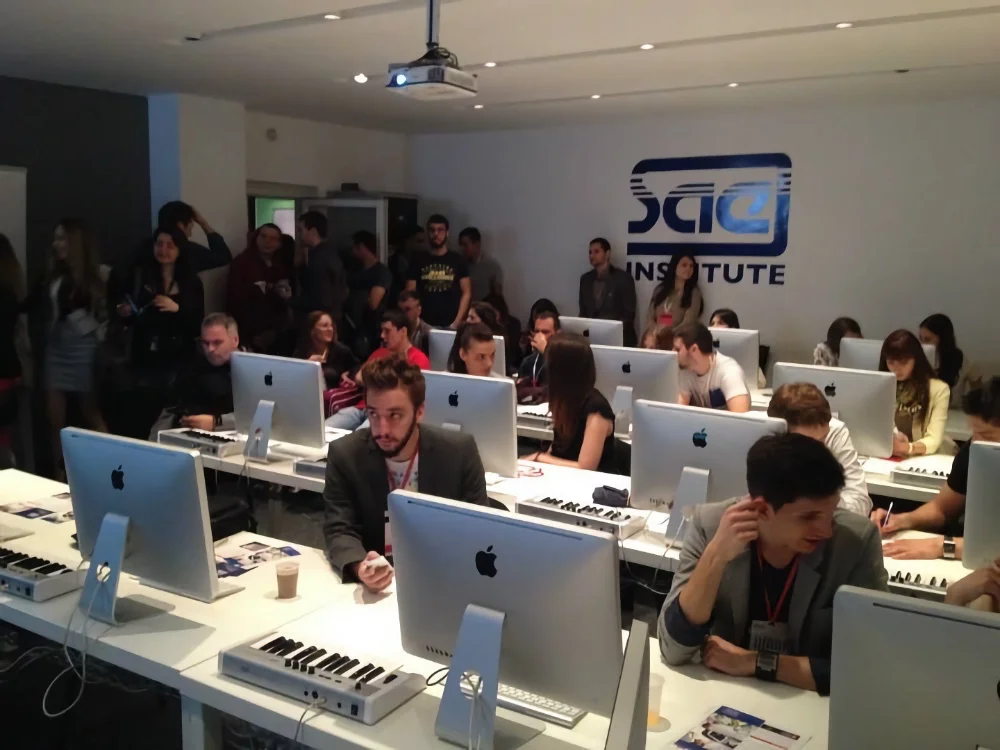
Programs Offered
SAE Institute offers a variety of programs in the field of audio, including an Audio Bachelor of Applied Science, Audio Diploma, and Audio Technology Diploma(2). These programs cover a range of topics such as studio production, mastering, sound design, game audio, projection mapping, and creative coding. The curriculum is designed to provide students with both theoretical knowledge and practical skills to become an audio engineer.
Faculty and Expertise
SAE Institute’s faculty consists of industry professionals with years of experience and many have received awards for their work. This ensures that students are learning from experts who are up-to-date with the latest trends and technologies in the audio industry.
Curriculum Highlights
The curriculum at SAE Institute is hands-on and project-based, with a focus on practical training in audio paired with critical thinking, résumé writing, and job interview practice. Students work with industry-standard microphones, audio mixing consoles, and digital audio workstations, and create a series of projects throughout the program to demonstrate their knowledge to prospective employers.
Industry Connections
SAE Institute has partnerships with music, entertainment, and creative media industry organizations to deliver unique work placement programs for its Bachelor students. These connections provide students with valuable industry experience and networking opportunities.
Tuition and Financial Aid
Tuition for the Audio Bachelor of Applied Science program at the Nashville Campus is $33,728.00 for both domestic and international students. Students are encouraged to refer to the current catalog for official information and details regarding tuition and fees, as well as financial aid options.
Career Support Services
SAE Institute offers lifetime Career Services support, with graduates having worked with companies like Sony Interactive Entertainment, Walt Disney World, Apple, Google, and AVID[. The career services team supports students in finding the right fit for their skills and interests in the audio industry.
SAE Institute has a global presence with campuses in various countries, providing students with a broad network and the opportunity to study in diverse cultural settings. The institute’s approach to education is geared towards preparing students for careers in the creative media industries with a blend of practical experience and theoretical knowledge.
Full Sail University
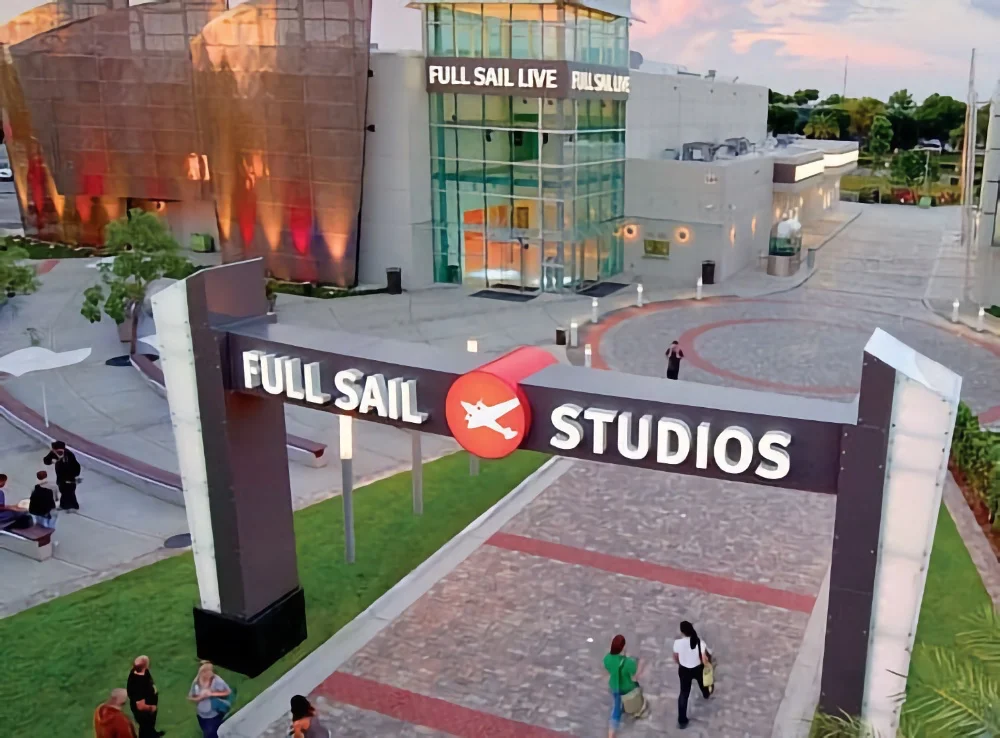
Programs Offered
Full Sail University provides a comprehensive range of music production-related degrees, including a Bachelor of Science in Music Production, which covers music theory, composition, digital recording, and music production(3). The curriculum is designed to prepare students for various career paths in music creation and production, with coursework that includes digital audio principles, digital workstation technology, and advanced audio production and engineering techniques.
Faculty and Expertise
The faculty at Full Sail University includes industry professionals with extensive experience in music production and related fields. For example, Dr. Charlie Griffin, as the Course Director for Project and Portfolio V in the Music Production degree program, brings advanced degrees in Music Theory & Composition and years of professional experience as a composer to the classroom.
Curriculum Highlights
Full Sail’s Music Production curriculum is hands-on and project-based, with students utilizing a personal production studio consisting of a laptop computer and professional audio-software programs. The program also emphasizes the development of communication and critical-thinking skills, with courses in professional writing and cultural studies.
Industry Connections
Full Sail University has a strong reputation for its connections to the music industry, with graduates working in various roles such as audio and sound-effects technicians, music supervisors, music editors, and more. The university’s Career Development department assists students with job searches, resume writing, and interviewing skills.
Tuition and Financial Aid
Tuition for the Music Production Bachelor of Science degree program is listed as $92,000 for campus learning and $64,000 for online learning. Full Sail offers several scholarships, such as the Creative Minds Scholarship and the Momentum Scholarship, to help students with tuition costs.
Career Support Services
Full Sail provides lifetime career support to its graduates, with services that include assistance with job placement and networking opportunities within the industry. The university also offers a variety of workshops and events to help students connect with industry professionals.
Full Sail’s campus features industry-standard facilities such as the Audio Temple recording studio and various music and audio labs. The university’s Project LaunchBox initiative provides students with a MacBook Pro and professional-grade microphones and headphones to support their education and creative projects. Full Sail’s accelerated programs allow students to earn their degrees in a shorter time frame compared to traditional four-year colleges.
BIMM Institute
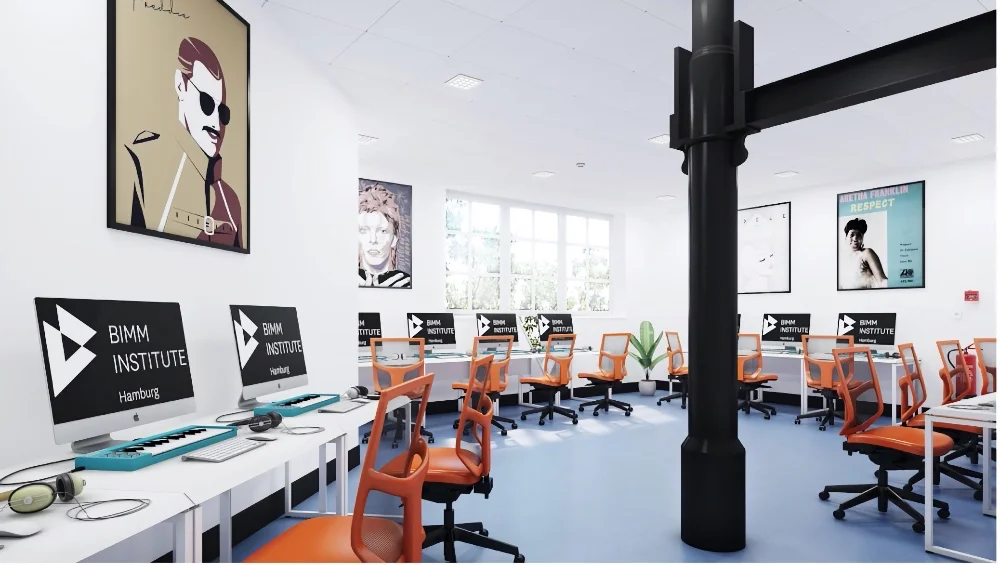
Programs Offered
BIMM Institute offers a variety of undergraduate courses, including BA (Hons) Music Production, BA (Hons) Electronic Music Production, and BA (Hons) Music and Sound Production. These programs are designed to cater to different aspects of music production, whether students are interested in electronic music, studio work, or a broader range of sound production contexts. Additionally, BIMM provides joint honors degrees such as BA (Hons) Music Production & Music Business, which combines technical production skills with industry knowledge(4).
Faculty and Expertise
The faculty at BIMM Institute comprises industry professionals with a wealth of experience in music production and related fields. Lecturers are active within the music industry, ensuring that students receive current and relevant insights into music production practices.
Curriculum Highlights
BIMM’s music production courses offer a balance of theory and practical skills, with opportunities to work in high-tech studios and access cutting-edge equipment and software. The curriculum includes core modules like Audio Fundamentals, Music Production in Context, and Studio Practice & Engineering, as well as optional modules that allow students to tailor their education to their career aspirations.
Industry Connections
BIMM Institute is known for its strong industry connections, providing students with masterclasses from top music producers and professionals, as well as networking opportunities through events and the BIMM Connect platform. The Careers and Industry Team helps students gain real-world experience through placements and internships.
Tuition and Financial Aid
For UK students, undergraduate courses are priced at £9,250 per year, while international students can expect to pay £15,950 per year. BIMM also offers scholarships and bursaries to support talented and dedicated applicants who may be in financial hardship(5).
Career Support Services
BIMM’s Career Team assists students in finding employment opportunities in the music industry, with alumni having gone on to work in various roles such as sound engineers, music producers, and audio designers. The institute’s Talent Match service helps connect graduates with entry-level jobs in the industry.
BIMM Institute has campuses in vibrant musical cities across the UK and Europe, offering a diverse and creative environment for students. The institute’s approach to education emphasizes hands-on experience and prepares students for a sustainable career in the music industry.
Icon Collective
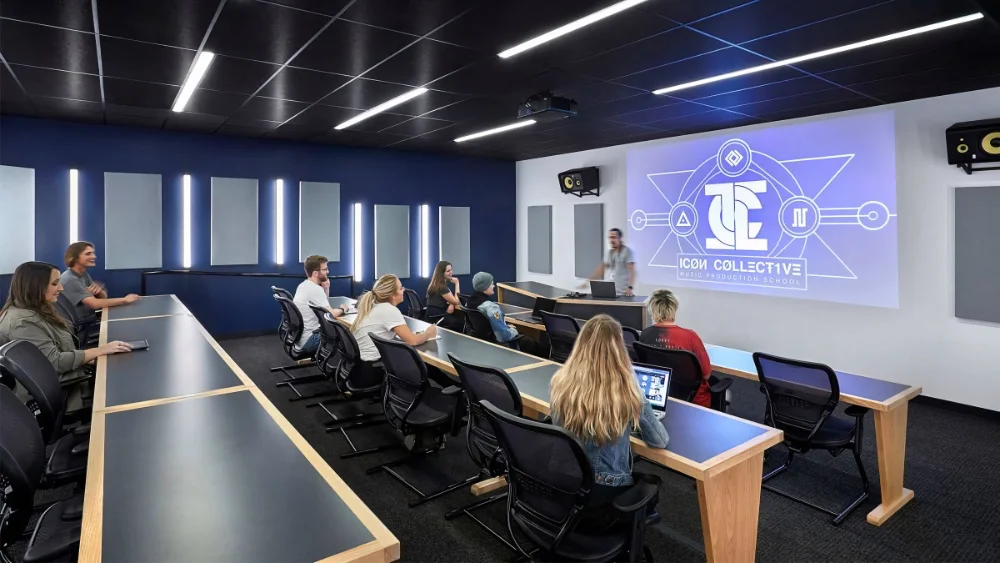
Programs Offered
Icon Collective offers a range of music production and industry programs tailored to different levels of experience and areas of interest. These include the Music Production Program, Advanced Music Production Program, Online Music Production Program, Music Business Program, and Vocal Artist Program. Each program is designed to equip students with core technical skills while fostering their unique creative process.
The curriculum emphasizes education in Ableton Live, with additional focus areas depending on the program, such as synthesis, mixing, mastering, songwriting, and music business.
BEST ONLINE ABLETON LIVE COURSES – CLICK HERE
Faculty and Expertise
Icon Collective prides itself on its faculty, comprised of industry professionals and experienced educators who are actively involved in the music industry. This ensures that students receive up-to-date knowledge and insights into current music production and business practices. The faculty’s deep industry experience and commitment to educational excellence create a supportive environment where creativity and technical prowess are nurtured.
Curriculum Highlights
A key feature of Icon Collective’s curriculum is its emphasis on one-on-one mentorship sessions with industry professionals, allowing for personalized feedback and guidance on students’ music projects. The programs cover a wide range of topics, including Ableton Live, synthesis, mixing and mastering, songwriting, ear training, and music business, depending on the specific program chosen. The Advanced Music Production Program, for example, includes all foundational courses plus advanced mixing, mastering, and vocal production, culminating in the creation of a 10-track album(6).
Industry Connections
Icon Collective emphasizes networking and industry connections, offering students opportunities to engage with successful alumni and industry professionals through guest artist Q&As and internships. The school’s location in Los Angeles, a major hub for the music industry, further enhances these opportunities, providing students with access to a vibrant music scene and potential career paths.
Tuition and Financial Aid
Tuition varies by program, with detailed information available upon contacting the admissions team. While Icon Collective does not offer traditional financial aid, it provides options for payment plans to help manage the cost of tuition. Prospective students are encouraged to explore these options and consider the investment in their education relative to their career goals in the music industry.
Career Support Services
Icon Collective offers career support services, including mentorship and networking opportunities, to assist graduates in transitioning into the music industry. The school’s strong focus on building a community among students and alumni facilitates ongoing support and collaboration, even after graduation.
Icon Collective’s state-of-the-art campus in Downtown Burbank features modern facilities, including over 25 studios, a performance theater, and teaching theaters, designed to provide an immersive learning experience. The school’s philosophy centers on empowering artists and entrepreneurs to live creative, successful lifestyles, with a curriculum that balances musical and technical training with personal development.
Abbey Road Institute
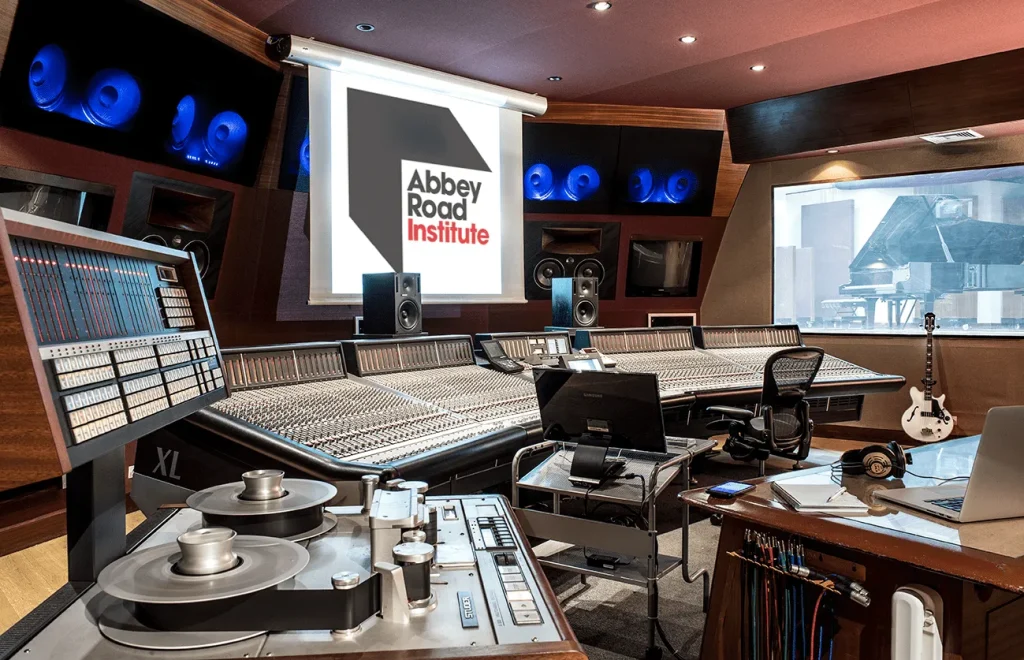
Programs Offered
Abbey Road Institute offers an Advanced Diploma in Music Production and Sound recording and reproduction, which is an intensive one-year program. The curriculum is designed in collaboration with industry professionals and is based on nearly 90 years of experience at Abbey Road Studios[6]. The program covers a broad range of topics, including acoustics, digital audio technology, mastering, music theory, production, recording, and sound theory(7).
Faculty and Expertise
The faculty at Abbey Road Institute includes industry experts and academics from all areas of the recording and music business. They bring a wealth of experience, expertise, and skills to the program, ensuring that students learn from professionals who are actively engaged in the music industry.
Curriculum Highlights
The curriculum is comprehensive and contemporary, relevant to today’s industry, and aims to develop well-rounded producers, engineers, and musicians. Students have access to Abbey Road Studios for classes, which is a unique feature of the program, providing an opportunity to record a full orchestra and gain hands-on experience in a world-famous setting.
Industry Connections
Abbey Road Institute maintains strong industry connections, offering students access to guest lectures and the opportunity to engage with professionals through the Industry Access program. These connections are invaluable for students looking to enter the music industry after graduation.
Tuition and Financial Aid
The total course fee for the Diploma in Music Production and Sound Engineering at the Miami campus is $51,350. Abbey Road Institute also offers a Diversity Scholarship Programme to support students from diverse backgrounds. However, the diploma is not eligible for UK undergraduate student loans.
Career Support Services
Abbey Road Institute provides students with practical, hands-on experience and the opportunity to build a network of contacts, which can lead to career opportunities in the music industry. The institute’s reputation and connections can be a significant advantage for graduates seeking employment.
Studying at Abbey Road Institute is a life-changing experience, with the chance to learn in the iconic Abbey Road Studios and be surrounded by the cultural legacy of the music industry. The institute’s approach to education emphasizes both technical skills and creative development, preparing students for a successful career in the modern music industry].
Where should I go to learn music production?
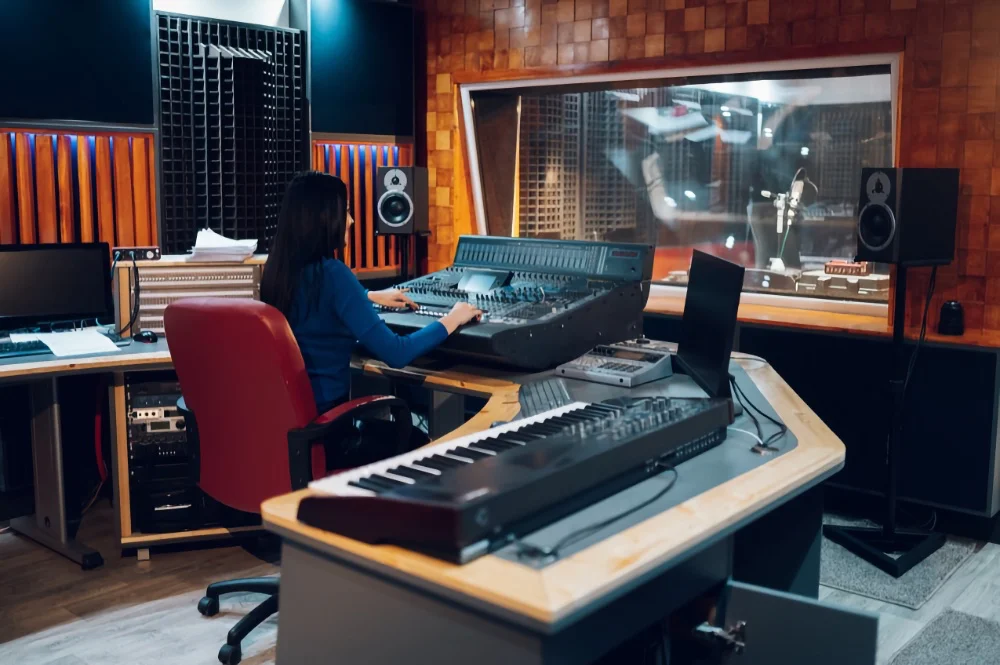
To learn music production, you should consider schools that offer a comprehensive curriculum encompassing various aspects of music production, such as Berklee College of Music, New York University, and SAE Institute. These institutions provide a blend of theoretical knowledge and practical skills through hands-on experience in state-of-the-art studios.
Is there a high demand for music producers?
The demand for music producers isn’t slowing down. As the industry pulses with new tech, there’s a growing need for pros who can mix, master, and bring fresh sounds to our playlists across all genres.
What Degree is Best for Music Production?
The best degree for music production is typically a Bachelor’s or Master’s in Music Production, Audio Engineering, or a related field. These degrees offer in-depth training in music technology, sound design, mixing & mastering, and other essential skills for a career in music production.
Curriculum and Specializations
Overview of Typical Coursework in Music Production Programs
Music production programs typically include coursework in audio engineering, sound design, electronic music production, mixing & mastering, music theory, and music business. Students learn to use industry-standard software like Ableton Live and Logic Pro X, and engage in projects that simulate real-world music production scenarios.
Different schools offer specializations in areas such as DJing, electronic music production, film scoring, sound design, and music business. For example, Berklee College of Music offers a specialization in music production on Coursera, which covers the art and technology of music production, including the use of Pro Tools.
Music production schools strive to balance technical skills with creative development. Students are encouraged to develop their unique artistic vision while mastering the technical aspects of music production, such as audio editing, mixing, and mastering techniques.
Faculty and Industry Connections
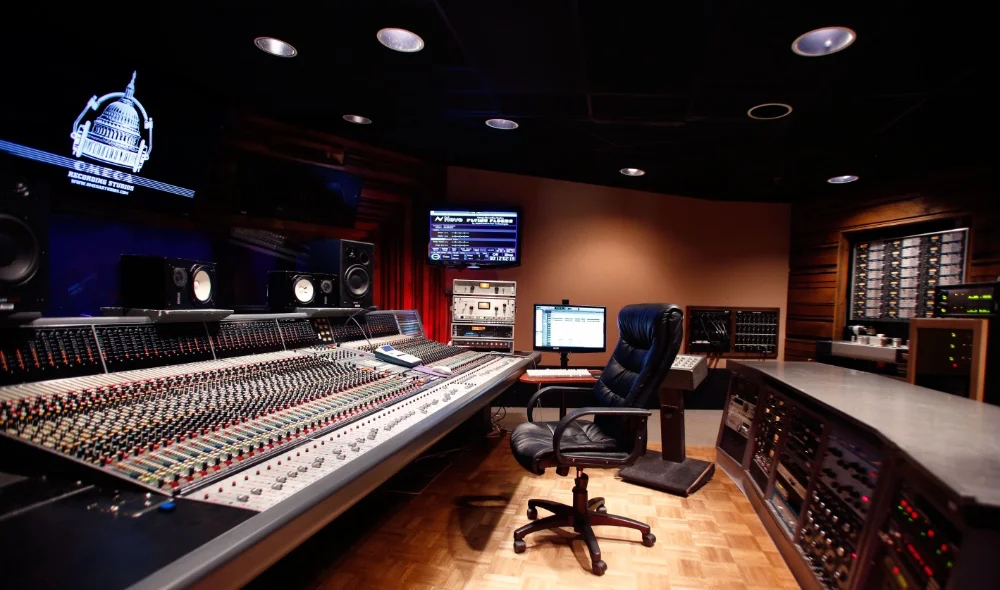
Experienced faculty play a crucial role in music production education. They provide industry insights, mentorship, and guidance to students, helping them to navigate the complexities of the music industry and develop the skills needed for success.
Many music production schools boast successful alumni who have made significant contributions to the music industry. These case studies serve as inspiration and provide valuable learning experiences for current students.
Networking is vital in the music industry, and schools often facilitate connections between students and industry professionals through internships, workshops, and events. These opportunities can lead to collaborations and job prospects after graduation.
Facilities and Resources in Music Production Schools
Music production schools like Berklee College of Music, SAE Institute, and Full Sail University are equipped with state-of-the-art studios and equipment, providing students with the necessary tools to create professional-quality music. These facilities often include advanced recording studios, mixing consoles, and a variety of instruments and software.
Students at music production schools have access to professional-grade software and tools such as Ableton Live, Logic Pro X, Pro Tools, and various plugins and virtual instruments. This access allows for hands-on learning and the development of technical skills essential for music production.
Hands-on experience is a critical component of music education. Schools like The Los Angeles Film School offer practical learning opportunities through recording sessions, live sound reinforcement, and music production for media, ensuring that students can apply their knowledge in real-world scenarios.
Online and Hybrid Learning Options

Online music production courses and degrees have become increasingly popular, offering flexibility and convenience for students. Institutions such as Point Blank Music School and Berklee College of Music provide interactive online classes, allowing students to study from anywhere in the world
Hybrid learning models combine online coursework with in-person sessions, offering a balanced approach to music production education. This model allows students to benefit from both the flexibility of online learning and the hands-on experience of on-campus facilities.
Career Prospects and Alumni Success
Graduates of music production schools can pursue various career paths, including audio engineering, music producing, sound design, and more. Schools like The Los Angeles Recording School have alumni who have worked with major artists and record labels, highlighting the potential for success.
How Much Money Do Music Producers Make?
The income of music producers can vary widely based on experience, location, and the specific industry sector they work in. However, with the right education and connections, music producers have the potential to earn a substantial income.
Alumni Success Stories and Their Contributions to the Music Industry
Alumni from music production schools often go on to make significant contributions to the music industry. Success stories from schools like The Los Angeles Recording School serve as inspiration for current students and demonstrate the impact of a solid education in music production.
The Role of Internships and Work Placements in Career Development
Internships and work placements play a crucial role in career development, providing students with real-world experience and networking opportunities. Many music production schools offer internship programs that can lead to job offers and collaborations after graduation.
Financial Considerations
The tuition fee for music production schools can vary, but many institutions offer financial aid options, scholarships, and grants to help students manage the cost of education
Specific scholarships and grants are available for music production students, which can significantly reduce the financial burden of pursuing a music degree
When considering a music production school, it’s important to weigh the cost of education against potential career outcomes. A quality education from a reputable school can lead to a successful career in the music industry, providing a significant return on investment
FAQ
Which country is best for music production course?
The best countries to study music production, based on practical reasons such as quality of education and affordability, are Australia, South Korea, the United States, Germany, and the United Kingdom.
Do music producers go to college?
Yes, most music producers go to college for music production to become experts in the skills required for creating, recording, and editing music. Colleges and universities in the United States offer programs specifically designed for music production.
Is music production a realistic career?
Music production is a realistic career, but its reliability can vary based on individual effort, networking, and the evolving nature of the music industry. While it offers creative fulfillment and potential financial rewards, success in music production often requires dedication, continuous learning, and adaptability.
What should I learn first for music production?
For music production, you should first learn about the five stages of the music production process: Composition, Arrangement, Sound Design and Production, Mixing, and Mastering. Understanding these stages will help navigate the production process and increase workflow efficiency.
How many years does it take to learn music production?
Typically, bachelor’s degrees for music production take four years to complete, while master’s degrees average two years but can range from one to three years. Certificate programs can vary in duration.
What are the top 5 music production schools in the world?
The top 5 music production schools often mentioned include Berklee College of Music (USA), Abbey Road Institute (various global locations), SAE Institute (worldwide campuses), The Los Angeles Recording School (USA), and Full Sail University (USA). These institutions are well-regarded for their comprehensive curricula, state-of-the-art facilities, and industry connections.
What criteria should be considered when choosing a music production school?
Important criteria include the schools reputation, the quality of faculty, available equipment and technology, curriculum relevance, networking opportunities with industry professionals, alumni success, internship programs, and job placement rates. Additionally, consider location and how it aligns with your career goals.
Are there scholarships or financial aid options available at these schools?
Yes, many of these top music production schools offer various forms of financial aid including scholarships, grants, loans, and work-study programs. Prospective students should research each institutions financial aid opportunities and understand the application process to secure funding for their education.
How do these schools incorporate practical experience into their programs?
These schools typically provide hands-on learning experiences through studio time, collaborative projects with musicians and other students, internships with recording studios or music companies, live sound production opportunities at events or concerts hosted by the school or in partnership with external organizations.
Can international students attend these music production schools?
Yes, international students can attend these music production schools. Most have dedicated support services to assist international applicants with admissions processes such as visa requirements and language proficiency. It is important for international students to check specific admission requirements for each institution theyre interested in.
Final Thoughts
The best music production schools in the world offer a combination of state-of-the-art facilities, access to professional-grade software, hands-on experience, and comprehensive online and hybrid learning options.
These institutions prepare students for a variety of career paths in the music industry and provide the necessary resources for both creative and technical development. With the right education, internships, and networking opportunities, graduates can achieve success and make meaningful contributions to the music industry.
Financial considerations are important, but the potential return on investment makes these programs a valuable choice for aspiring music producers.
Citations
(1) https://college.berklee.edu/faculty
(2) https://usa.sae.edu/meet-our-pros/
(3) https://catalog.fullsail.edu/sites/default/files/pdf/degree/music-production-bachelor-of-science-campus.pdf
(4) https://www.bimm.ac.uk/courses/ba-hons-joint-music-production-music-business/
(5) https://www.bimm.ie/fees-finance/scholarships-bursaries/
(6) https://www.iconcollective.edu/music-production-programs
(7) https://abbeyroadinstitute.co.uk/courses/diploma-music-production-sound-engineering/curriculum/

